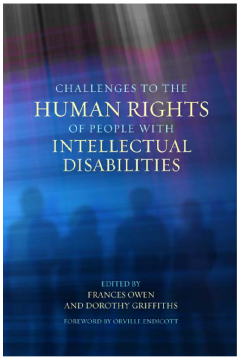
BOOK
Challenges to the Human Rights of People with Intellectual Disabilities
Krystine Donato | Orville Endicott | Maurice Feldman | Beverley Fedoroff | Voula Marinos | Jocelin Lecomte | Diane Cox-Lindenbaum | Paul Fedoroff | William R Lindsay | J Gregory Olley | Barbara Vyrostko | Shelley L. Watson | Marjorie Aunos | Donato Tarulli | Kajsa Klassen | Jennifer Robinson | Tricia Vause | Marion Trent-Kratz | Karen Stoner | Christine Tardiff-Williams | Jacqueline Murphy | Nancy Miodrag | Frances Owen | Deborah Richards | Kaleigh Regehr | Yona Lunsky | Carol Sales | Celine Mercier | Susan Havercamp | Carolyn Gracey | Dorothy Griffiths | Leanne Gosse
(2008)
Additional Information
Book Details
Abstract
A book such as this both demonstrates the progress that has been made over recent years, and will also serve to enhance respect for the human rights of persons with intellectual disabilities in the years to come.'
- From the Foreword by Orville Endicott
This wide-ranging volume provides a multidisciplinary examination of human rights and the lives of people with intellectual disabilities.
The book combines historical, psychological, philosophical, social, educational, medical and legal perspectives to form a unique and insightful account of the subject. Initial chapters explain the historical context of rights for people with intellectual disabilities, including the right to life, and propose a conceptual framework to inform contemporary practice. Contributors then explore the many theoretical and practical challenges that people with intellectual disabilities face, in exercising their civil rights, educational rights or participatory rights, for instance. The implications arising from these issues are identified and practical guidelines for support and accommodation are provided.
This book will be an essential resource for practitioners, advocates, lawyers, policy-makers and students on disability courses.
This book is a very welcome contribution to the international scholarship on human rights for people with intellectual disability. Editors Frances Owen and Dorothy Griffiths have produced a stimulating compilation on the challenges that people with intellectual disability face in relation to human rights...This book stimulates readers to think about how to concretely apply human rights. We are all challenged to develop right-promoting strategies across the spectrum of our services, and we welcome the views of people with intellectual disability on whether the human rights agenda has made a meaningful difference in their lives.
Tizard Learning Disability Review
Owen and Griffiths, the editors of this book, present a most refreshing and comprehensive narrative placing the rights of people with learning disablilities in an international context.
Community Living
Table of Contents
| Section Title | Page | Action | Price |
|---|---|---|---|
| 1. Bolivia does not exist | |||
| 2. Before Bolivia: Indigenous cultures (Llanos de Moxos, Tiwanaku and Lake Titicaca) | |||
| 3. The mountain that eats men: Silver, colonialism and globalisation (Potosí) | |||
| 4. Tin kings and rubber barons: Tin, rubber and tycoons (Oruro, Cochabamba and Trinidad) | |||
| 5. Flat white: Lithium and salt (Salar de Uyuni and the Reserva Nacional de Fauna Andina Eduardo Avaroa) | |||
| 6. Amazon primed: Development projects, ecotourism and the climate crisis (Rurrenabaque, Parque Nacional Madidi and Lago Poopó) | |||
| 7. The future is behind us: Indigenous identities, migration and urbanisation (La Paz and El Alto) | |||
| 8. Mission control: The Jesuit legacy in the eastern lowlands (Santa Cruz de la Sierra and Chiquitos) | |||
| 9. You triumph or you die: On the trail of Che Guevara (Samaipata, La Higuera and Vallegrande) | |||
| 10. Coca si: The ‘war on drugs’ and the rise of Evo Morales (The Yungas, the Chapare and Cochabamba) | |||
| 11. A stampede in Sucre: The past and the future (Sucre) |
